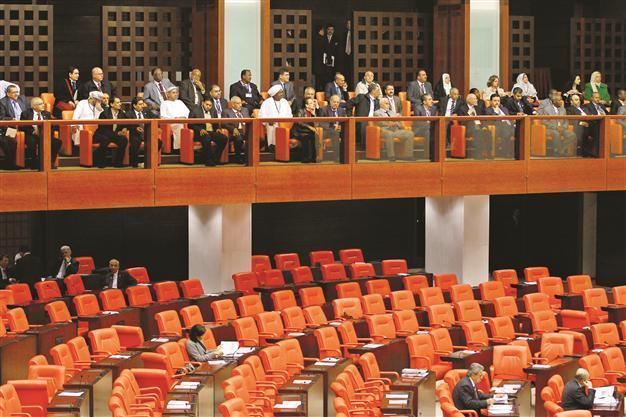Summer scenarios in Ankara
ANKARA - Hürriyet Daily News

The ruling Justince and Development Party (AKP) and the Peace and Decomcracy Party (BDP) may make the Parliament work in summer. AA Photo
The capital is being stirred with positive or negative scenarios focused on the solution process. The talk is the withdrawal of the outlawed Kurdistan Workers’ Party (PKK), repatriation and rehabilitation, the new Constitution process, the possible referendum, democratization steps and the internal confusion of parties. Unless the agenda goes upside down, summer will be very hot and busy.
In connection with all of these, calculations about the local elections in March 2014 and the presidential elections – either in the current system or under a presidential system – in August are the main headlines in political circles. In the capital, those on the political scene are preparing for a hot summer with a complicated, intertwined and interactive agenda. Several scenarios have emerged from the political corridors as Ankara proceeds with firm steps with a hope for peace that is stronger than yesterday. What is interesting in these scenarios is that they are extremely realistic.
Let’s together take a look at these whispered scenarios. Simultaneously with the withdrawal of the PKK, democratization steps will be taken. While PKK forces are retreating across the borders, the “road cleaning” works will start, which was among the demands of PKK leader Abdullah Öcalan, as well as the PKK and the Peace and Democracy Party (BDP). The Parliament will be kept open the entire summer for this purpose. The anti-terror law and the Turkish Penal Code will be changed. The anti-democratic clauses will be eliminated. Those obstacles before the freedom of thought and expression will be removed. The political party law will be changed. The elections threshold will be lowered. Legal arrangements will be made to facilitate “homecoming” after the withdrawal. There will be arrangements for the release and rehabilitation of PKK members.
Efforts to include CHPThe ruling Justice and Development Party (AKP) and BDP may try to persuade the main opposition Republican People’s Party (CHP) to join them in these amendments. For this purpose, the 16-clause “democracy package” of the CHP announced by leader Kemal Kılıçdaroğlu may be put into effect. In the CHP package, there are suggestions such as making Nevruz a holiday. This package may be adopted by the partnership of the AKP and BDP. Just like in the assessment commission proposal, the AKP and BDP may submit a package to the Parliament also containing CHP demands. This way, the support that they could not obtain during the formation of the assessment commission may be sought during the legal amendments. No matter how much the CHP resists, it may find it difficult to oppose its own motions in the name of democratization. The AKP, to persuade the CHP, may do the visit that it refrained from doing.
The new Constitution scenarios whispered are also realistic. According to them, the Parliament Constitution Conciliation Commission will end its work at the end of April or beginning of May. The AKP will go to the CHP and make an offer to write the Constitution together. The CHP will refuse that. Since the Nationalist Movement Party (MHP) has already said “no,” then the second address will naturally be the BDP. The AKP will sit with the BDP and write a joint Constitution. Or ask for support for its own constitution. Primarily for those “preamble, basic principles, fundamental rights and freedoms,” the two parties have submitted similar proposals in several critical articles. The BDP has given “the green light for the presidential system.” The two parties will make the Parliament work during the summer. In fall, the new Constitution will be voted on in a referendum.
If the MHP and CHP react in an extreme fashion to the AKP’s writing of the new charter in the Parliament, and if there emerges a risk of being rejected in the referendum, then there could be some steps taken backward. That scenario is as such: The AKP will propose the “president connected to a party” model instead of the presidential system to break the opposition. In this case, the business of carrying the “presidential system” into the new Constitution will be postponed until after the 2015 elections. The positive and negative scenarios do not end here, but, no doubt, Ankara is preparing maybe for one of the hottest, most critical and most difficult tests in its history.
BDP DENIES ALEVİ RESISTANCE
“Is there an Alevi-leftist group within the PKK that is resisting the peace process?” This question was brought up by ruling Justice and Development Party (AKP) circles. The answer came from Peace and Democracy Party (BDP) co-chair Gültan Kışanak while talking to journalists: “This approach is totally wrong; it is a lie. I am talking as the co-chair of a party that has spoken a couple of times with Kandil, that has seen the letters and that is in control of the process. It is out of the question that any wing within the PKK has a different approach regarding the process. Are Alevis and leftists automatically against peace?”
“All political structures who say they believe in democratic politics should walk toward peace,” she said.
CHP MAY RESHAPE BEFORE POLLS
A “reformist-ultranationalist” debate is ongoing in the main opposition Republican People’s Party (CHP). Reformist Gülseren Onanç had to leave the Central Executive Board (MYK), while ultranationalist Dilek Akagün Yılmaz was referred to the disciplinary board.
CHP leader Kemal Kılıçdaroğlu is caught between two wings. It is being whispered that deputy chairs Şafak Pavey, Emrehan Halıcı, Yakup Akkaya, Perihan Sarı, Nihat Matkap and Sezgin Tanrıkulu will be moved outside the MYK. The expectation that Adnan Keskin may be shifted to the parliamentary deputy speaker position is high. For a new party front desk, names that are being bandied about are Burhan Şenatalar, Fikri Sağlar, Ercan Karakaş, Veli Ağababa, İlhan Cihaner and Gökçe Pişkin.
